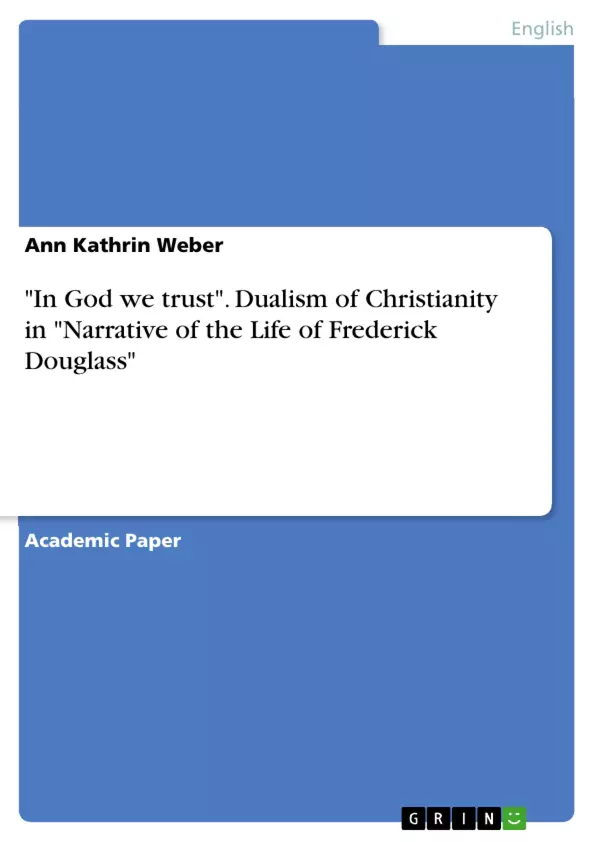This paper argues that Frederick Douglass exposed the American double standard towards Christianity. To verify this thesis, Douglass' Narrative is first put into context, both into the context of its time as well as into the context of its genre, the African American slave narrative. Subsequently, the American sociologist Robert N. Bellah’s term and definition of “American Civil Religion” is introduced. Finally, the author applies a close reading of Douglass’ Narrativethrough Bellah’s findings, whichshows how and why Douglass unveiled the Christian yet cruel values of Southern plantation owners to his readers. By means of conclusion,the paper shows that Douglass's Narrative paved the way for other abolitionist slave writers, who might not had been able to tell their story if the American Christian double-standard had not been exposed by Douglass.
Inhaltsverzeichnis (Table of Contents)
- Introduction
- The Silent Second Text?
- American Civil Religion
- The Road To Heaven Is Paved With Selfish Intentions
- From Inch To Ell
- Bibliography
Zielsetzung und Themenschwerpunkte (Objectives and Key Themes)
This paper aims to demonstrate how Frederick Douglass, through his Narrative of the Life of Frederick Douglass, exposed the hypocrisy and double standards embedded within American Christianity's relationship with slavery during the antebellum period. The paper examines Douglass's work within the context of the African American slave narrative, highlighting its unique contribution to the genre.
- The duality of Christianity in antebellum America.
- The portrayal of slave narratives as a genre.
- The concept of American Civil Religion.
- The impact of Douglass's Narrative on the abolitionist movement.
- The legacy of Douglass's work in contemporary literature.
Zusammenfassung der Kapitel (Chapter Summaries)
The paper begins by situating Douglass's Narrative within the historical and literary context of the African American slave narrative, highlighting the genre's emphasis on the religious conversion of slaves. The paper then explores the concept of American Civil Religion, as defined by sociologist Robert N. Bellah, to analyze how Douglass's narrative reveals the dissonance between professed Christian values and the reality of slavery. This analysis will focus on how Douglass exposed the hypocrisy of slave owners who claimed to be devout Christians while perpetuating the system of slavery. The paper will then delve into Douglass's own narrative strategy, demonstrating how he differentiates himself from earlier slave narratives and offers a new model for the genre. This chapter will explore how Douglass's narrative emphasizes self-reliance, education, and the pursuit of freedom through individual action, rather than relying solely on Christian benevolence.
Schlüsselwörter (Keywords)
This paper focuses on the key terms and concepts of Frederick Douglass's Narrative of the Life of Frederick Douglass, exploring the duality of Christianity, the African American slave narrative, American Civil Religion, and the themes of freedom, self-reliance, and education. The paper also examines the legacy of Douglass's work in contemporary literature and its continued relevance in understanding the complex interplay of faith and social justice in the United States.
Frequently Asked Questions
How did Frederick Douglass expose the hypocrisy of American Christianity?
Douglass revealed the double standard where slave owners claimed to be devout Christians while committing cruel acts, highlighting the dissonance between faith and the reality of slavery.
What is "American Civil Religion" in the context of Douglass's work?
It refers to the sociological concept by Robert N. Bellah, used to analyze how national values and religious beliefs were intertwined and misused to justify the institution of slavery.
How does Douglass's narrative differ from other slave narratives?
While many narratives focused on religious conversion, Douglass emphasized self-reliance, education, and individual action as the primary paths to freedom.
What impact did the "Narrative of the Life of Frederick Douglass" have on abolitionism?
It paved the way for other abolitionist writers by effectively dismantling the moral justifications for slavery provided by Southern Christian plantation owners.
What are the key themes of Douglass's Narrative?
The central themes include the duality of Christianity, the importance of literacy/education, the quest for freedom, and the concept of self-reliance.
- Quote paper
- Ann Kathrin Weber (Author), 2013, "In God we trust". Dualism of Christianity in "Narrative of the Life of Frederick Douglass", Munich, GRIN Verlag, https://www.grin.com/document/274286



